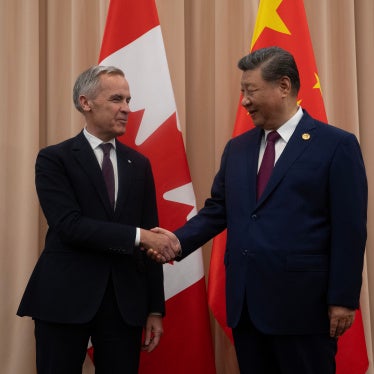Recent executions in Belarus exemplify repression on a scale unprecedented in the post-Soviet era, and the EU should apply more pressure on the Lukashenka regime – says Human Rights Watch.
The international condemnations of the two executions announced last Saturday in Belarus came fast and furious, but of course they were too late to make a difference. Thorbjorn Jagland, secretary general of the Council of Europe, said Belarus was increasingly isolated from the rest of the world due to its "disrespect of basic human rights". Markus Loening, Germany's human rights commissioner, was cutting in his criticism, describing Alyaksandr Lukashenka, Belarus' authoritarian president, as "a dictator without heart or mercy".
Lukashenka had last week refused to pardon the two men, Dzmitry Kanavalau and Uladzislau Kavalyou, both aged 26, who were convicted last year for a number of offences, including a deadly attack on the Minsk metro. An estimated 400 people have been executed in Belarus since 1991, and the country of 9.5 million people on the European Union's borders remains the only European country to use the death penalty. As if the executions were not awful enough for the relatives, Lyubov Kavalyova, Kavalyou's mother, was only informed of her son's death after the event, in a letter from the Supreme Court.
Capital punishment is wrong in principle and should be abolished. Belarus should at the very least introduce an immediate moratorium on executions. And this uniquely cruel form of punishment is also – as in this case – plagued with arbitrariness, prejudice and error. Did the two young men actually commit the bombings in April 2011 for which they were executed, in which 15 people were killed and over 200 injured?
Independent experts and human rights groups repeatedly expressed their concerns about due process and other fair trial violations, including torture and other forms of ill-treatment, during the investigation and trial. Kanavalau and Kavalyou were executed despite the fact that Kavalyou's mother had submitted a petition on her son's behalf to the United Nations human rights committee, which, following standard practice, asked the Belarus government not to carry out the sentence until the committee had reviewed and issued a decision in the case. As in previous execution cases in Belarus, the two men initially confessed to the crime, but later retracted their confessions, with family members claiming both men were beaten or tortured during police interrogation.
Sadly, the executions fit a wider pattern of human rights abuses in Belarus, triggered most recently by the crackdown on protests in December 2010 after flawed elections gave Lukashenka another term. Over 700 protesters, including dozens of journalists and seven presidential candidates, were arrested at the time, and many served 15-day prison terms for "hooliganism". Since then the levels of repression have been unprecedented in the post-Soviet era, with heavy restrictions on the media and freedom of assembly. Human rights defenders, lawyers, journalists and political activists have been the target of harassment campaigns, and several prominent opposition figures remain in prison.
So what can be done? The EU was correct last month when it widened its sanctions against the Lukashenka regime, listing 21 judges and top police officers who face travel bans and asset freezes in the EU. The executions should strengthen its resolve further. Minsk's reaction, telling the Polish ambassador and the head of the EU delegation to leave Belarus, should not deter the EU from putting the sanctions into effect.
The EU should also use its influence to maintain pressure on Belarus in the UN's human rights council in Geneva. Last June the council, in a move reserved for severe cases of human rights abuses, condemned the recent violations and instructed Navi Pillay, the high commissioner for human rights, to monitor the situation in Belarus and report back. Her report is due in June. The international community should use this opportunity to send a clear message that human rights abuses must stop immediately.
Perhaps most important, ordinary citizens in Belarus must know they are not forgotten. People continue to stand up to the regime, knowing they could face severe consequences, and these actions deserve respect and backing. At the weekend, after the two deaths were announced, groups of people angered by the executions laid flowers and lit candles outside the metro station where the bombing occurred last year.
Tatyana Snezhinskaya, a teacher who attended, told the international media: "The government shot these boys so quickly [after the trials] that I have even more doubts about their guilt. The death penalty should be abolished. We should not take the lives of people, especially of those who might be victims of judicial errors or political orders". Such brave gestures deserve international support.
Hugh Williamson is director of the Europe and Central Asia division of Human Rights Watch







